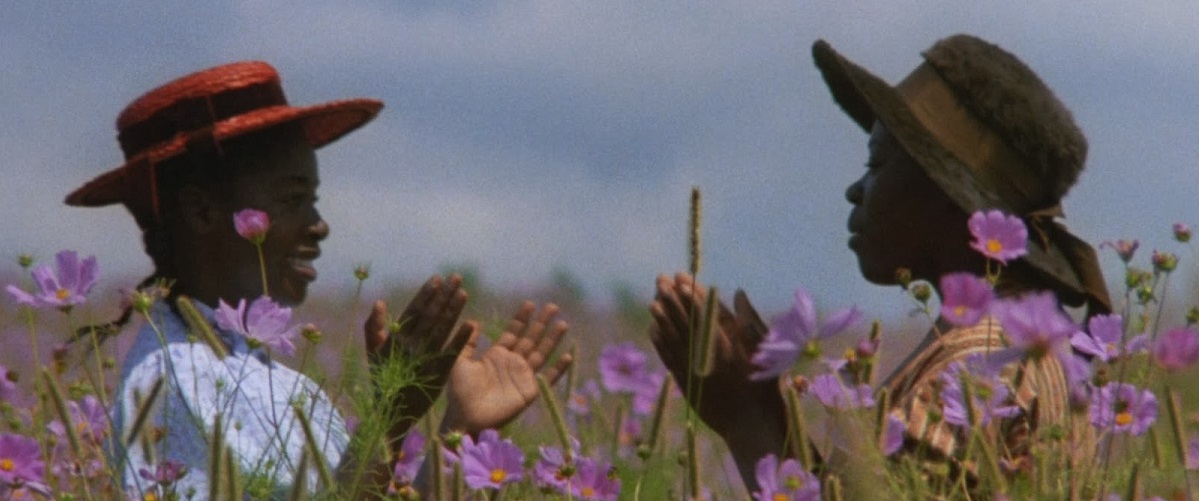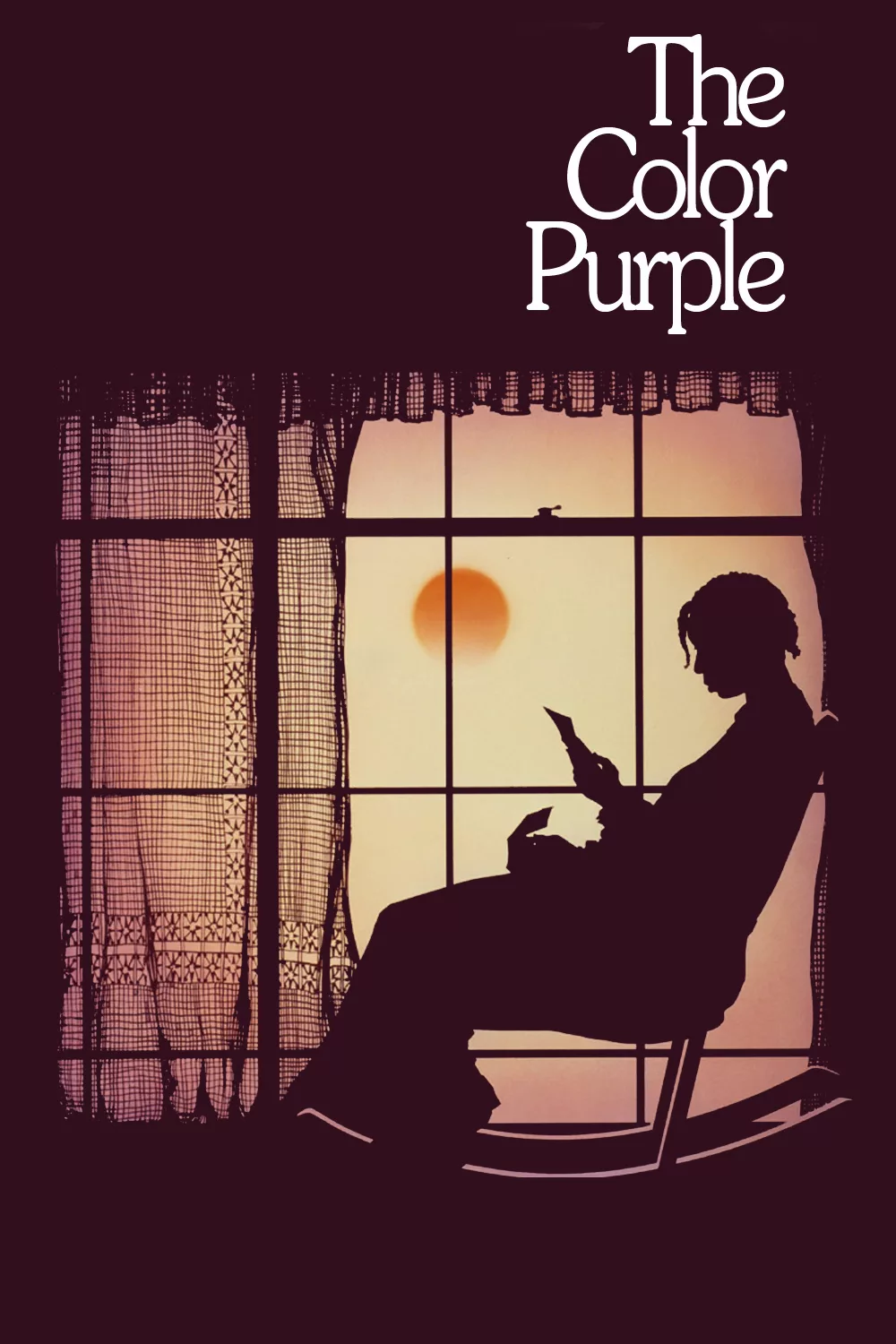We are republishing this review in honor of the 10th anniversary of the passing of Roger Ebert. Read why one of our contributors chose this review here.
There is a moment in Steven Spielberg‘s “The Color Purple” when a woman named Celie smiles and smiles and smiles. That was the moment when I knew this movie was going to be as good as it seemed, was going to keep the promise it made by daring to tell Celie’s story. It is not a story that would seem easily suited to the movies.
Celie is a black woman who grows up in the rural South in the early decades of this century, in a world that surrounds her with cruelty. When we first see her, she is a child, running through fields of purple flowers with her sister. But then she comes into clear view, and we see that she is pregnant, and we learn that her father has made her pregnant, and will give away the child as he had done with a previous baby.
By the time Celie is married – to a cruel, distant charmer she calls only “Mister” – she will have lost both her children and the ability to bear children, will have been separated from the sister who is the only person on Earth who loves her, and will be living in servitude to a man who flaunts his love for another woman. And yet this woman will endure, and in the end she will prevail. “The Color Purple” is not the story of her suffering but of her victory, and by the end of her story this film had moved me and lifted me up as few films have. It is a great, warm, hard, unforgiving, triumphant movie, and there is not a scene that does not shine with the love of the people who made it.
The film is based on the novel by Alice Walker, who told Celie’s story through a series of letters, some never sent, many never received, most addressed to God. The letters are her way of maintaining sanity in a world where few others ever cared to listen to her. The turning point in the book, and in the movie, comes after Celie’s husband brings home the fancy woman he has been crazy about for years – a pathetic, alcoholic juke-joint singer named Shug Avery, who has been ravaged by life yet still has an indestructible beauty.
Shug’s first words to Celie are: “You as ugly as sin.” But as Shug moves into the house and Celie obediently caters to her husband’s lover, Shug begins to see the beauty in Celie, and there is a scene where they kiss, and Celie learns for the first time that sex can include tenderness, that she can dare to love herself. A little later, Celie looks in Shug’s eyes and allows herself to smile, and we know that Celie didn’t think she had a pretty smile until Shug told her so. That is the central moment in the movie.
The relationship between Shug and Celie is a good deal toned down from the book, which deals in great detail with sexual matters. Steven Spielberg, who made the movie, is more concerned with the whole world of Celie’s life than he is with her erotic education. We meet many members of the rural black community that surrounds Celie. We meet a few of the local whites, too, but they are bit players in this drama. Much more important are people like Sofia (Oprah Winfrey), an indomitable force of nature who is determined to marry Harpo, Mister’s son by a first marriage. When we first see Sofia, hurrying down the road with everyone trying to keep up, she looks like someone who could never be stopped. But she is stopped, after she tells the local white mayor to go to hell, and the saddest story in the movie is the way her spirit is forever dampened by the beating and jailing she receives. Sofia is counterpoint to Celie: She is wounded by life, Celie is healed.
Shug Avery is another fascinating character, played by Margaret Avery as a sweet-faced, weary woman who sings a little like Billie Holiday and has long since lost all of her illusions about men and everything else. Her contact with Celie redeems her; by giving her somebody to be nice to, it allows her to get in touch with what is still nice inside herself.
Mister, whose real name is Albert, is played by Danny Glover, who was the field hand in “Places in the Heart.” He is an evil man, his evil tempered to some extent by his ignorance; perhaps he does not fully understand how cruel he is to Celie. Certainly he seems outwardly pleasant. He smiles and jokes and sings, and then hurts Celie to the quick – not so much with his physical blows as when he refuses to let her see the letters she hopes are coming from her long-lost sister.
And then, at the center of the movie, Celie is played by Whoopi Goldberg in one of the most amazing debut performances in movie history. Here is this year’s winner of the Academy Award for best actress. Goldberg has a fearsomely difficult job to do, enlisting our sympathy for a woman who is rarely allowed to speak, to dream, to interact with the lives around her. Spielberg breaks down the wall of silence around her, however, by giving her narrative monologues in which she talks about her life and reads the letters she composes. The wonderful performances in this movie are contained in a screenplay that may take some of the shocking edges off Walker’s novel, but keeps all the depth and dimension. The world of Celie and the others is created so forcibly in this movie that their corner of the South becomes one of those movie places – like Oz, like Tara, like Casablanca – that lay claim to their own geography in our imaginations.
The affirmation at the end of the film is so joyous that this is one of the few movies in a long time that inspires tears of happiness, and earns them. “The Color Purple” is the year’s best film.




















